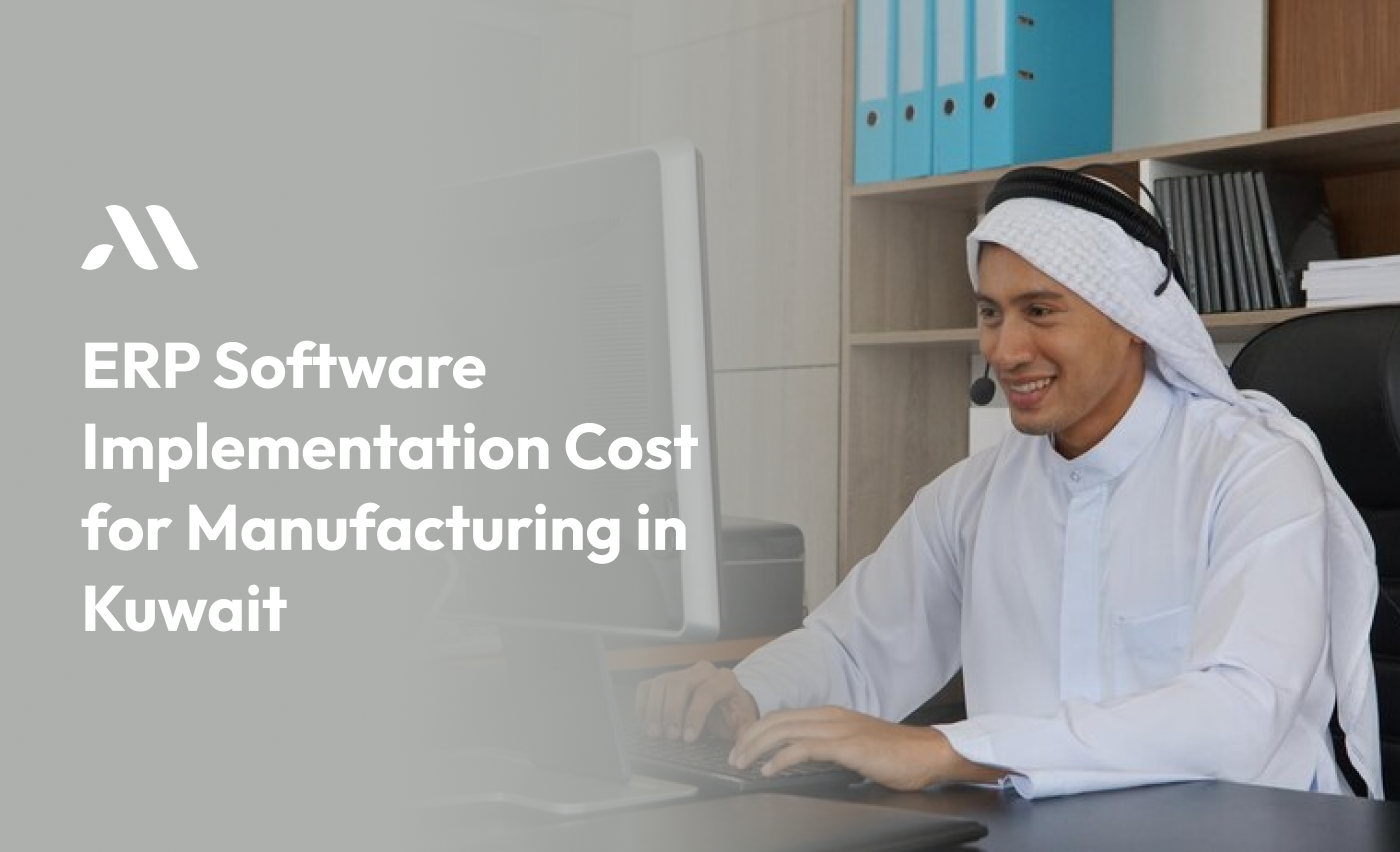Introduction
Implementing ERP (Enterprise Resource Planning) software is an important decision for any manufacturing business in Kuwait. It helps simplify operations, improve productivity, and reduce costs. However, understanding the ERP implementation cost is Important for making an informed choice. In this article, we'll explore the factors affecting the ERP implementation cost, the Benefits of implementing an ERP system, and tips to manage these costs effectively.
According to industry reports, businesses can reduce operational costs by up to 20% with effective ERP implementation. However, around 60% of ERP projects exceed their initial budget due to unforeseen complexities.
Understanding ERP Implementation Cost
What is ERP Implementation Cost?
ERP implementation cost refers to the total expenses associated with setting up an ERP System in your manufacturing business. This cost includes software licensing, hardware, customization, data migration, training, and ongoing support. The ERP implementation cost can vary significantly based on the size of your business, the complexity of the system, and the specific needs of your manufacturing operations.
"Investing in an ERP system is not just about the cost; it's about the value it brings to your business. A well-implemented ERP system can be the backbone of your manufacturing operations, driving growth and efficiency."
Factors Influencing ERP Implementation Cost
Software Licensing: The cost of the ERP software itself can be a major factor. Depending on the features and the vendor, the cost of licensing can vary. Some vendors provide subscription-based pricing, while others charge a one-time fee.
Customization: Custom ERP Development is usually necessary to customize the software to your specific business processes. The more customization required, the higher the ERP implementation cost.
Data Migration: Moving existing data from your old systems to the new ERP system can be time-consuming and costly. The complexity of data migration impacts the overall ERP software implementation cost.
Training: Employees need to be trained to use the new ERP system effectively. Training costs depend on the number of users and the complexity of the ERP software.
Support and Maintenance: After the ERP system is implemented, ongoing support and maintenance are necessary to keep the system running smoothly. This includes software updates, troubleshooting, and customer support, which add to the ERP implementation cost.
Tip: To manage ERP implementation cost, prioritize the features you need and consider phased implementation to spread the cost over time.
ERP Implementation Cost in Kuwait
For manufacturing businesses in Kuwait, the ERP implementation cost can range widely. Small to medium-sized enterprises can spend between KWD 10,000 to KWD 50,000, while larger businesses could see costs exceeding KWD 100,000. It's important to get a detailed quote from an ERP vendor to understand the exact ERP software implementation cost for your business.
Note: Always allocate a contingency budget of at least 15-20% of the total ERP implementation cost to handle unexpected expenses.
Benefits of Implementing an ERP System
Investing in ERP software provides many benefits that can justify the ERP implementation cost:
Improved Efficiency: ERP systems automate and simplify business processes, reducing manual work and errors. This leads to faster production cycles and better resource management.
Better Decision-Making: With real-time data and analytics, ERP systems provide valuable insights that help in making informed business decisions. This is particularly important for managing inventory, production schedules, and supply chain logistics.
Cost Savings: Although the initial ERP software implementation cost can be high, the long-term savings from reduced labor, better inventory management, and increased productivity can offset these expenses.
Scalability: Custom ERP development helps you to scale the system as your business grows, without the need for a complete overhaul. This flexibility can save costs in the long run.
Remember: The benefits of implementing an ERP system are not just limited to cost savings. The improved efficiency and better decision-making capabilities can lead to increased profitability and growth for your manufacturing business.
Also Read - Top ERP Solutions for Growing Businesses in 2024
Managing ERP Implementation Cost
To manage ERP implementation cost-effectively, consider the following strategies:
Choose the Right ERP Vendor: Not all ERP systems are created equal. Work with a reputable ERP vendor or a Custom ERP Development Company that understands the unique needs of manufacturing businesses in Kuwait. This ensures that you get the best value for your investment.
Start Small: Consider implementing the ERP system in phases. Start with the most critical modules and expand as needed. This approach allows you to manage costs and see immediate benefits.
Invest in Training: Proper training ensures that your employees can use the ERP system efficiently, reducing errors and improving productivity. This can lead to quicker ROI and lower overall ERP implementation costs.
Monitor and Adjust: Regularly monitor the performance of the ERP system and adjust your strategy as needed. This proactive approach can prevent costly issues down the line.
Conclusion
Understanding and managing ERP implementation costs is important for manufacturing businesses in Kuwait. By carefully planning, choosing the right vendor, and focusing on the long-term benefits, you can make the most of your investment. Remember, the goal is not just to minimize costs but to maximize the value that the ERP system brings to your business. Whether you opt for custom ERP development or work with a trusted ERP vendor, the right ERP solution can transform your manufacturing operations and set you on the path to success.
Ready to transform your manufacturing business with the right ERP solution? MicraSol can help! We specialize in custom ERP development to fit your needs. Contact us today to learn more about how we can reduce your ERP implementation cost and boost your efficiency. Let’s make your business better together!
Note: Before committing to an ERP system, always conduct a thorough cost-benefit analysis to ensure that the ERP implementation cost aligns with your business goals and budget.
FAQS
Why should manufacturing businesses in Kuwait consider ERP software?
ERP software helps streamline operations, reduce errors, and improve overall efficiency, which can save money and help the business grow.
What factors affect the ERP Implementation Cost?
The cost depends on the size of the business, the complexity of operations, the features needed, and whether the ERP is customized for specific needs.
How long does it take to implement ERP software?
It usually takes several months, but the exact time can vary based on the project’s complexity and the specific needs of the business.
Can ERP software be customized for my manufacturing business in Kuwait?
Yes, ERP software can be customized to fit your specific needs, but this might increase the overall cost of implementation.
Are there any hidden costs in ERP implementation?
It's important to consider ongoing costs like maintenance, training, and updates. These costs should be factored into the total ERP Implementation Cost.








